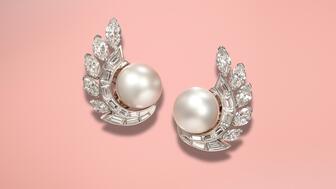The entrepreneur and “Shark Tank” star will share his top tips for success.
Martin Rapaport vs. De Beers
Rapaport lambasted De Beers in his annual breakfast presentation in Las Vegas and has since publicly claimed the diamond company is destroying transparency in the trade. Editor-in-Chief Michelle Graff examines the genesis of his claims.
Those who attended Martin Rapaport’s annual breakfast presentation at JCK Las Vegas, and followed the subsequent back-and-forth that ensued between the price list king and diamond giant De Beers, probably were left with a lot of questions.
At the presentation, Rapaport shouted and gestured on stage with his usual fervor while raising a number of entirely valid concerns about the diamond industry.
Among them: transfer pricing—the practice of undervaluing a resource, such as diamonds from Africa, in order to increase profitability and decrease tax liability—that allegedly takes place in Dubai, an issue that was at the center of the 2016 NGO boycott of the Kimberley Process.
We should not, he told me in a lengthy interview following the jewelry trade show, be “put to sleep” by the leadership of the industry saying perfunctorily professing that all is well when serious problems do exist.
But the bulk of Rapaport’s ire was directed at De Beers for not allowing others in the diamond trade to use the De Beers name further down the supply pipeline.
How long has been De Beers been doing this, and why?
And why is it an issue right now? (As it turns out, the clause in De Beers’ sightholder contract restricting the use of its name downstream—the one that Rapaport put up on the screen during his talk at JCK Las Vegas—has been in place for more than a decade.)
I talked to both De Beers and, as mentioned above, Rapaport following the Las Vegas jewelry trade shows to find out more.
The Source of Rapaport’s Ire
Rapaport told me that he found out about De Beers’ rules regarding the use of its name when he was investigating source certification for RapNet. Rapaport wants to begin distinguishing between diamonds that have source certification and those that don’t on his trading platform.
It was during these talks that he discovered that De Beers does not allow use of its name downstream, which is true.
It is outlined in clause 3.6.6 in the signature license of their sightholder contracts, and it reads: “You will not represent that any particular diamond or diamonds are sourced, or originate, from us or any member of the De Beers Group except with our prior written consent.”
Now the question becomes, why is De Beers doing this?
Well, according to what Rapaport said at his breakfast in Las Vegas, De Beers is denying source information
He called De Beers a “cold, cruel corporation.”
Immediately following the breakfast, De Beers responded in a statement, not to deny its policy regarding the use of its name but to supply its own reason why Rapaport was so concerned with its name-use policy: because the company had told him “no” when he asked to use the De Beers name on RapNet.
It was a rare move for De Beers, which almost never responds to public attacks.
“What Martin wants is to be able to market diamonds from De Beers Group, using the De Beers brand, on his platform for his benefit. We don’t think this is fair, and we told him so,” the statement reads in part. “Martin had planned to use the JCK show to discuss his source certification. We engaged with Martin multiple times over several weeks, but when we did not comply with his wishes, he threatened us repeatedly. We were unmoved and we continue to be so.”
I asked Rapaport about this statement when we talked right after the shows. He told me, and has since said publicly, that De Beers is lying. He said he never asked to use the De Beers name specifically and, in fact, he doesn’t want to use it. But, he asked them, why can’t he use another name on invoices connected to diamonds mined by De Beers, like Diamond Trading Co. (DTC)?
De Beers never responded to Rapaport’s statement claiming the company was lying, but Rapaport persisted, issuing another statement claiming De Beers is “destroying transparency in the diamond industry” with this policy.
So, I asked De Beers about all of this. What do they have to say about Rapaport branding them as liars and claiming they are destroying transparency in the diamond trade? And, more importantly, why won’t the company let people attach “De Beers” to its diamonds or even just “DTC”?
In response to the former, De Beers spokesperson David Johnson told me: “We stand behind our statement. De Beers hasn’t lied,” about what Martin Rapaport requested in the run-up to his Vegas breakfast.
In answer to the latter question, De Beers gives a couple reasons.
No. 1, it doesn’t want to create confusion between De Beers Jewellers (its stores, formerly known as De Beers Diamond Jewellers) and Forevermark, its diamond brand that is not sold in its stores.
No. 2, they don’t have any control over the diamonds after they’ve been sold as rough—meaning they don’t know who’s owned them, who’s traded them, if they’ve been fracture-filled, treated, etc. They don’t want the De Beers name used, except on diamonds they’ve controlled from mine to market.
As for the use of Diamond Trading Co., Johnson allowed while it is a “fairer point,” everyone in the industry knows the DTC is De Beers, adding that De Beers doesn’t think it is Rapaport’s place to tell the company how to run its business.
“It’s not really for Martin to say, ‘You will do X and you will do it this way or that way,” Johnson said, which, I would say, also is a fair point.
The company does allow those who sell its diamonds downstream to say they come from mines in one of four countries—Botswana, Namibia, Canada or South Africa—and De Beers feels that that is enough.
But, I asked, is the first point really such an issue considering the United States has only four De Beers Diamond Jewellers stores? Johnson acknowledged that there aren’t that many stores, but there are a lot of Forevermark-carrying jewelers, not just in the U.S. but around the world.
What about Martin’s claims that De Beers will eventually be going straight to the consumer with Forevermark?
It did just open a company-operated Forevermark store in China geared toward millennials and announced at its annual breakfast in Las Vegas that it will be selling online direct to consumers in the U.S., though retailers will be getting a cut of those sales. (It is also worth noting that the company is going to insert the De Beers name into Forevermark marketing materials this year, the first time it has done so.)
Rapaport's claim in that respect is not entirely baseless. At that same breakfast, Forevermark executives laid out a five-year plan for all its jewelers, which, according to the presentation, is for them to “have a Forevermark brand experience in store,” whether it is an in-store brand corner, store-in-store zone or standalone Forevermark boutique owned and operated by Forevermark jewelers (not De Beers).
Where the Truth Lies
Rapaport is entirely correct about one point: De Beers, as a publicly owned company, is going to do what’s best for Anglo American’s shareholders in the end. I think how the company moves forward with Forevermark, blockchain and “ethical” sourcing in general is definitely something the trade should pay attention to in the coming years, as interest in the origin of diamonds and being able to track them will only intensify.
Even though the clause in the sightholder contract dates back 13 years, De Beers has evoked it as recently as last summer in response to a request from sightholders seeking to participate in the GIA’s Mine to Market (M2M) provenance program, a move JCK News Director Rob Bates called “wrongheaded” in an August 2017 editorial.
But don’t think for a second that Martin Rapaport isn’t also all about doing what’s best for Martin Rapaport’s business. He likes to portray himself as a champion for the little guy but, in the end, he’s made a lot of money in this business and will continue to find ways to do so.
Charles Wyndham made a very valid point in a piece posted to his website, PolishedPrices.com, late last month about the whole Rapaport-De Beers row that’s entertaining and definitely worth reading.
Specifically commenting on Rapaport’s crowing about De Beers’ lack of transparency, Wyndham wrote:
“The Rap list has put a glass ceiling on polished diamond prices for decades, it is an outrageously opaque system based on his opinion, so to accuse De Beers about lack of transparency is ripe in the extreme.Editor’s note: This story was updated post-publication to correct Rob Bates’ title. He is the news director at JCK, not the senior editor as previously stated.
De Beers have certainly hit the nail on the head when complaining about [Rapaport’s] screaming and shouting as if he was paragon of moral rectitude, he isn’t, but then who is?”
The Latest

The Ukrainian brand’s new pendant is modeled after a traditional paska, a pastry often baked for Easter in Eastern European cultures.

The jeweler has announced a grand reopening for its recently remodeled location in Peoria, Illinois.

The “Strong Like Mom” campaign features moms who work at Tiffany & Co. and their children.


Interior designer Athena Calderone looked to decor from the 1920s and 1930s when crafting her first fine jewelry collection.

During a call about its full-year results, CEO Efraim Grinberg discussed how the company is approaching the uncertainty surrounding tariffs.

Bench jewelers spend years honing their skills, Jewelers of America’s Certification validates their talents.

The free program provides educational content for jewelry salespeople and enthusiasts to learn or refresh their diamond knowledge.

The feedback will be used to prepare other jewelers for the challenges ahead, the organization said.

The online sessions are designed to teach jewelers to use AI tools like ChatGPT and Claude to grow their business.

The opening marks the jewelry retailer’s first location in the Midwest.

The “United in Love” collection offers tangible mementos of hearts entwined with traditional and non-traditional commitment heirlooms.

Robert Goodman Jewelers will hold a “Black Jewelry Designers and Makers” event on April 27.

The announcements follow a tumultuous start to 2025 for WJA, which saw a wave of resignations following controversial statements about DEI.

The historic fancy vivid blue diamond set to headline Christie’s Geneva sale next month could sell for up to $50 million.

LVMH CFO Cécile Cabanis also discussed the effects of tariffs so far.

The “Mad Men” and “The Morning Show” star steals jewelry, art, and handbags from his wealthy neighbors in “Your Friends & Neighbors.”

The organization has reelected Kalpesh Jhaveri as president.

An investigation found that the former managing director of Movado’s Dubai branch overstated and prematurely recorded sales.

The collection pays tribute to the Japanese philosophy of Ma, studying balance, stillness, and the interplay between presence and absence.

Mari Lou’s Fine Jewelry in Orland Park, a suburb of Chicago, is closing its doors.

GIA’s labs in Dubai and Hong Kong are now accepting larger diamonds in light of the “logistical challenges” presented by the new tariffs.

These earrings by Van Cleef & Arpels, featuring the same design as a pair worn by Princess Grace, are up for auction at Woolley & Wallis.

Two experts share how artificial intelligence tools can help retailers run a more efficient business.

Kentaro Nishimura, who has been with the pearl company since 1997, has been promoted to president and CEO of Mikimoto America.

“America Telling Time: 150 Years of Bulova” explores the storied history of the American watchmaker.




























